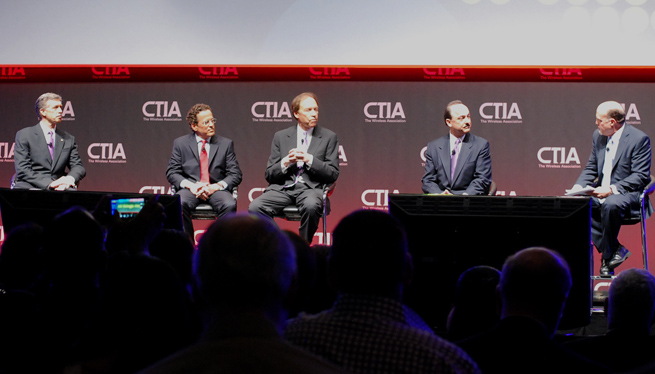When the CEOs of AT&T Mobility, Verizon Wireless, Sprint, and T-Mobile sit together on the same panel, sparks fly.
[aditude-amp id="flyingcarpet" targeting='{"env":"staging","page_type":"article","post_id":427793,"post_type":"story","post_chan":"none","tags":null,"ai":false,"category":"none","all_categories":"mobile,","session":"C"}']Just as they did a year ago, these prominent CEOs sat down today at the CTIA Wireless conference to talk about the mobile industry. Bombastic CNBC host Jim Cramer led the keynote session, which featured Ralph de la Vega, CEO of AT&T Mobility; Dan Hesse, CEO of Sprint Nextel; Dan Mead, CEO of Verizon Wireless; and Philipp Humm, CEO of T-Mobile.
Before the session began, each CEO gave a speech outlining his company’s priorities and expectations of consumers. What was fascinating about seeing them all lined up in a row was seeing how their styles contrast.
AI Weekly
The must-read newsletter for AI and Big Data industry written by Khari Johnson, Kyle Wiggers, and Seth Colaner.
Included with VentureBeat Insider and VentureBeat VIP memberships.
- Verizon’s Mead came out first and talked at length about the coming “spectrum crunch,” emphasizing that there isn’t enough wireless spectrum available now to satiate the demand that consumers have (and will have in the coming years). Without solving the spectrum crunch, Mead warned, the American economy could be hurt, as the mobile industry fuels much job growth and innovation.
- Sprint’s Hesse walked out second and focused his talk on trust and security. He said that consumers are confused about the terms “LTE” and “4G” and that “the number four has been misused.” Then he pivoted to say that security on smart devices would emerge in the next year as a much bigger priority, something Sprint is committed to solving.
- T-Mobile’s Humm spoke third and focused his speech on T-Mobile’s recovery. He admitted that T-Mobile’s period as an acquisition target for AT&T damaged the company’s reputation and lost it customers. But now that the company is out of the deal, it can now regain customers’ trust. The vision he wants to project is that T-Mobile is highly affordable yet still on the cutting edge of tech. He finished the talk by showing a new ad that claims T-Mobile can offer a much better experience than what can be had with an iPhone 4S on AT&T.
- AT&T’s de la Vega spoke last and used much of his time to pump up the company’s small-but-potent 4G LTE network and Digital Life, AT&T’s just-announced home automation and security system. On the LTE front, de la Vega cited a PC World study of LTE networks that showed AT&T as the winner. As for Digital Life, which won’t really take off until at least late this year, de la Vega seemed enthusiastic that it could wildly add to what consumers demand from service providers of in-home technology.
After the four CEOS got their time to shine, things really got interesting when they had to sit next to each other and answer questions from the entertaining and sometimes erratic Cramer, who hosts Mad Money on CNBC.
Cramer and the CEOs mostly acted civilly throughout, with each of the CEOs tying his answers to his presentation. Hesse referred to security and trust, de la Vega to LTE and home solutions, Mead to spectrum, and Humm to T-Mobile’s bright future.
One of the most interesting moments of the conversation was when Cramer brought up the new advertisement T-Mobile showed off. In the ad, a T-Mobile motorcyclist quickly outruns an AT&T motorcyclist, signifying the relative speeds of their mobile networks. AT&T’s de la Vega said the ad was simply not true and that its LTE network was quite fast. Humm shot back, saying the ad is iPhone-specific, and correctly pointed out that the iPhone can only take advantage of HSPA 14 on AT&T. de la Vega finished the verbal sparring by saying it’s not fair to compare a single device’s performance on a network to the network as a whole.
In another interesting moment, Cramer suggested to Humm that T-Mobile should separate from parent company Deutsche Telekom and file for its own IPO. Humm smartly refused to say anything on the matter but admitted that CTIA would be the perfect audience for such an announcement.
As for a full video recap of the panel, we will post a link once one is available.
Roundtable photo: Sean Ludwig/VentureBeat
[aditude-amp id="medium1" targeting='{"env":"staging","page_type":"article","post_id":427793,"post_type":"story","post_chan":"none","tags":null,"ai":false,"category":"none","all_categories":"mobile,","session":"C"}']
VentureBeat's mission is to be a digital town square for technical decision-makers to gain knowledge about transformative enterprise technology and transact. Learn More
